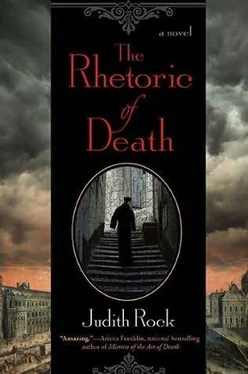Judith Rock - The Rhetoric of Death
Здесь есть возможность читать онлайн «Judith Rock - The Rhetoric of Death» весь текст электронной книги совершенно бесплатно (целиком полную версию без сокращений). В некоторых случаях можно слушать аудио, скачать через торрент в формате fb2 и присутствует краткое содержание. Жанр: Исторический детектив, на английском языке. Описание произведения, (предисловие) а так же отзывы посетителей доступны на портале библиотеки ЛибКат.
- Название:The Rhetoric of Death
- Автор:
- Жанр:
- Год:неизвестен
- ISBN:нет данных
- Рейтинг книги:3 / 5. Голосов: 1
-
Избранное:Добавить в избранное
- Отзывы:
-
Ваша оценка:
- 60
- 1
- 2
- 3
- 4
- 5
The Rhetoric of Death: краткое содержание, описание и аннотация
Предлагаем к чтению аннотацию, описание, краткое содержание или предисловие (зависит от того, что написал сам автор книги «The Rhetoric of Death»). Если вы не нашли необходимую информацию о книге — напишите в комментариях, мы постараемся отыскать её.
The Rhetoric of Death — читать онлайн бесплатно полную книгу (весь текст) целиком
Ниже представлен текст книги, разбитый по страницам. Система сохранения места последней прочитанной страницы, позволяет с удобством читать онлайн бесплатно книгу «The Rhetoric of Death», без необходимости каждый раз заново искать на чём Вы остановились. Поставьте закладку, и сможете в любой момент перейти на страницу, на которой закончили чтение.
Интервал:
Закладка:
“A chiming clock!” Jouvancy snorted. “The ancients would never think of anything so absurd!”
“Well, they didn’t have clocks,” Charles said reasonably.
“True. But never forget, the arts are for imitating nature, Maitre du Luc. ‘The monkeys of nature,’ as our dear Pere Menestrier says so well in his learned treatise on ballets. Are there clocks in nature? No, there are not clocks in nature.”
“But there is time,” Charles murmured, admiring a sketch for the Horizon’s shimmering costume, half black, half white.
Jouvancy chuckled. “All right, Maitre Charles du Luc. I see we will get on together. And whether we do or not, we have a ballet to present in just two more weeks. Not to mention the tragedy.” He cocked his head, his eyes bright with curiosity. “Though I am pleased to have you here, I have been wondering-so late in our rehearsals, a bare two weeks before a show, is a peculiar time to acquire an assistant. Not that I am ungrateful, of course.” He waited hopefully.
Smiling blandly, Charles shrugged and gave the answer he’d prepared. “My superiors decided I had been at Carpentras long enough. In addition to teaching at the school, I had also been a student there, you know.”
“I see. Well, your arrival comes just as I am realizing that this production is hopeless.”
“Hopeless? Do they really dance so badly?”
“No, no, thanks to Beauchamps, they dance very well, most of them. But they do not care why they dance. They do not care that the dance is meant to show every movement of the emotions and the eloquence of the soul shining through the body. Without that, it is nothing. Yet these wretched boys only want to show the shapely leg, jump higher than their confreres, and wear the richest costume. Though surely you know all that. Boys are boys, even at little Carpentras.”
“True,” Charles laughed. “But as long as they didn’t trip over their feet and the ballet amused parents and patrons, the rector there was satisfied.” Though Charles hadn’t been. Only rarely had he come across a boy who had it in him to make what he danced burn with beauty. “After all, the ballets are to adorn the yearly prize-giving and provide some enjoyment for the boys near the end of the school year, are they not, mon pere?”
“Of course, but you are at Louis le Grand now. The king himself is our patron, my dear Maitre du Luc, which means that he helps pay for the ballet. As well as the year’s academic prizes. Do you have any idea what those suitably bound tomes we give as prizes cost? So the ballet must be superb, because we cannot afford to lose the king’s money! Anything less would be an insult, since King Louis was such a very gifted dancer himself. And I do not say that only because he is the king. Look.”
He pointed to the wall behind Charles. Charles turned in his chair and saw a gilt-framed painting of a half-grown boy in a golden tonneau-a stiff, tight-waisted coat standing out over his breeches like a very short skirt. The coat’s full sleeves were tied with yellow ribbons at elbow and wrist, and the shoes, heeled and square-toed, sported rayed golden suns. The boy’s face was still softly rounded and his silky light brown hair curled on his shoulders. He wore a crown with golden rays, and above it a tall sheaf of waving white plumes.
“That is the king,” Jouvancy said reverently. “Only fourteen, dancing as France’s Rising Sun in Cardinal Mazarin’s Ballet of Night. I was there and I tell you, it was magnificent. My father wanted me to see the king reclaim his kingdom after the horrors of the nobles’ revolt-the Fronde, that was, before your time. Anyway, the room-in the Petit-Bourbon palace-was crowded beyond belief, and my father and I, being of little importance, were shoved away in a corner. It was February, but the room was stifling from the crowd, and I soon fell asleep on the floor-I was just ten. The ballet really did last all night, twelve hours. My father shook me awake at daybreak and lifted me up onto his shoulders in time to see our young Rising Sun come in at the east windows. Ah-” Something of the ten-year-old’s wonder on that long-past morning glowed on Jouvancy’s face. “It seemed to me that the sun himself had truly danced down into our midst. He did his sarabande down the room, with all the Graces dancing in his train. All around me courtiers were weeping and kneeling. Such a fine dancer he was, a beautiful dancer.” Jouvancy sighed. Then he laughed and returned to the present. “Though you’d never think it to look at him now,” he said, glancing down somewhat complacently at his own trim figure, “because he has become a very fine eater. Not fat, really. Just-ah-solid.”
In spite of his current feelings about Louis XIV, Charles was moved by this glimpse of the young monarch reclaiming his kingdom. But he still didn’t much want to talk about the king.
“What is this year’s ballet called, mon pere?”
“ Les Travaux d’Hercules. Hercules represents Louis, of course.”
Of course. So much for not talking about the king. And these labors of Hercules-Louis would inevitably include revoking the Edict of Nantes and outlawing the Huguenots, because college ballet, like court ballet, referred to real people and events. The people and events were always veiled under layers of allegory and symbol, but recognizable to the educated audience that easily read the code of Greek and Roman heroes and their myths.
“Is the ballet your creation, Pere Jouvancy?”
“The livret, yes.” The priest picked up the blond wig from his desk and draped it on his fist. It looked like it had caught mange from someone’s lap dog. He frowned at it and looked at Charles’s thick, springy hair. “Nearly a match,” he murmured.
Charles involuntarily pressed his skullcap more firmly onto his head with his left hand and winced as his old shoulder wound twinged. Yesterday’s wet, cold hours in the saddle had taken their toll.
“Are you hurt, Maitre du Luc?”
“Just an old war souvenir, mon pere.”
Jouvancy studied him with a gravity Charles had not seen until now. “Where were you wounded?”
“At the battle of St. Omer.”
“Ah, the Spanish Netherlands. Perhaps, then, you’ve come to this life as our St. Ignatius did?”
“In a small way, mon pere. As I am a much smaller man. In the year when I was recovering, someone gave me the story of his life to read and-well-here I am.” Wanting to turn the conversation, he said, “Who is dancing the role of Hercules?”
“Philippe Doute,” Jouvancy said, with a worried sigh. “Our best dancer, who has longed for the starring role in the ballet since he was in the little boys’ grammar class. But, I don’t know why, lately he has not been as attentive as he should be. And last Friday he was so preoccupied and almost discourteous that Beauchamps threatened to replace him, even at this last minute.” The rhetoric professor picked up a wide, feathered hat, put it on the blond wig, and studied the effect. The mange still showed. “Which I truly pray does not happen, because this is Philippe’s last year, and he is a bright, good boy, one of our best. He is also my nephew, I should tell you, so I am not unbiased. But even though he is presently as secretive and sullen as a thwarted courtier, he is a talented dancer and a good scholar. Ah, well, sixteen is a terrible age, all teachers know that.” He smiled at Charles. “Especially those, like you, who are not so very far from it.”
“Twelve years from sixteen, mon pere,” Charles said, trying not to let his irritation make him sound as young as Jouvancy was making him out to be. In spite of his impressive size, people often thought him younger than he was. He supposed the time would come when he would enjoy that, but it had not come yet.
Читать дальшеИнтервал:
Закладка:
Похожие книги на «The Rhetoric of Death»
Представляем Вашему вниманию похожие книги на «The Rhetoric of Death» списком для выбора. Мы отобрали схожую по названию и смыслу литературу в надежде предоставить читателям больше вариантов отыскать новые, интересные, ещё непрочитанные произведения.
Обсуждение, отзывы о книге «The Rhetoric of Death» и просто собственные мнения читателей. Оставьте ваши комментарии, напишите, что Вы думаете о произведении, его смысле или главных героях. Укажите что конкретно понравилось, а что нет, и почему Вы так считаете.












